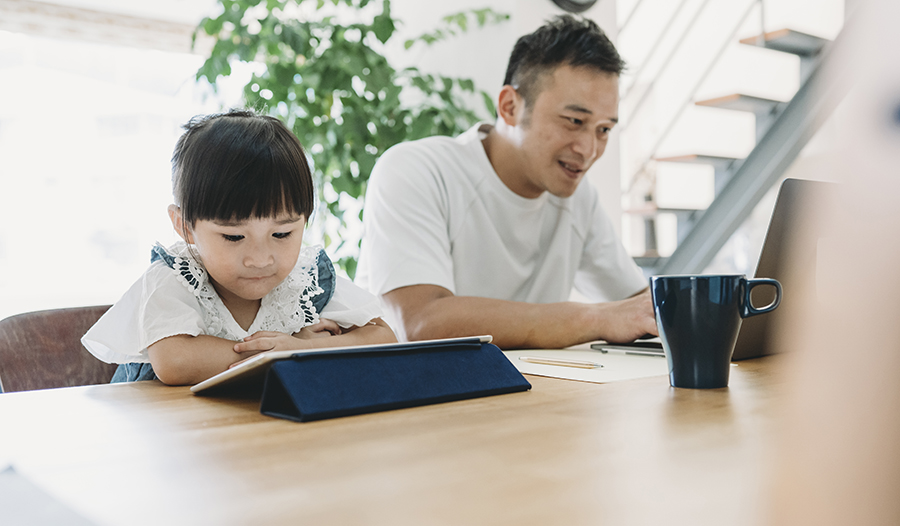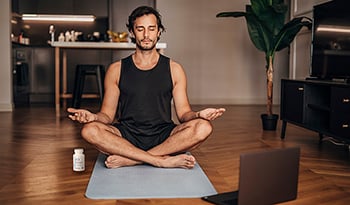5 Healthy Habits for Working from Home
DISCLAIMER:This blog does not intend to provide diagnosis...
- In this article:
- 1. Establish a Routine
- 2. Set Boundaries
- 3. Practice Sleep Hygiene
- 4. Bolster Your Immune System with Good Nutrition
- 5. Relax with Aromatherapy
- Do What's Right for You

Disasters tend to produce a tremendous amount of anxiety and create different stressors for everyone. When people are stressed, information is processed differently from when we are relaxed and feeling in control. Our minds and bodies will respond differently, with emotions ranging from shock and disbelief to fear, anger, guilt, and even numbness.
Our minds can be affected by just imagining loved ones risking their lives by leaving their homes, and we may experience confusion, frustration, difficulty making decisions, and nightmares. This may lead to poor sleep, feelings of fatigue, excessive eating, and lack of motivation.
It is natural to experience these ranges of emotions and physical reactions. But, with many uncertainties looming overhead and many things out of our control, working from home can feel more stressful than ever. Although working from home does have its perks, if not structured appropriately, it can lead to a feeling of lack of purpose or motivation. Also, the tremendous amount of stress we feel can distract us from our routines and regular eating habits.
Below are some wellness tips that can aid in building good habits while working from home.
1. Establish a Routine
Although social distancing can change our day-to-day, sticking with familiar routines when possible can help us feel more like ourselves. Two studies on routines and the meaning of life have shown that habits enhance a sense of having a purposeful behavior. Researchers found that meaning in life does not have to be associated with extraordinary events or achievements, but rather from what are often mistaken as the mundane daily experiences that add up throughout our day. So, showering and getting dressed as if you're going to the office can help get your day off to a good start.
Setting up a schedule for your meetings and establishing a specific work area for yourself and other family members will also help you feel organized and accomplished. Take breaks and check-in with yourself and others. If you live alone, call a friend or parent, or play with your pet, or maybe play your favorite game online. The important thing is to engage in routine behaviors because these may re-create a feeling of connection in a larger context and promote a sense of meaning, which is highly associated with well-being.
2. Set Boundaries
It's easy to try to be too productive while working from home and overschedule conference calls or make unrealistic to-do lists. Sometimes you may not have control of this, but be mindful of the amount of time spent in video conferences, which can lead to feeling overwhelmed, or what has been termed "video-call fatigue."
Given the high stress and anxiety during this time, constant breaking news of death and suffering can lead us to produce uncharacteristic reactions to what could have been seen as simple frustrations in the past. So, when you're on your fifth video conference of the day, you're not only physically exhausted from looking down at a screen and sitting in a dining room chair, you're also emotionally drained from the barrage of breaking news and from seeing other colleagues and friends in similar situations.
Take breaks in between video calls by standing and stretching for a few minutes or even taking a short walk. Answer some of the calls on your phone and take notes with a pen and paper. Lastly, although studies have shown that connecting with friends and loved ones can help prevent social isolation, limiting the amount of social media, particularly before bedtime, can help control anxiety levels.
3. Practice Sleep Hygiene
The practice of "sleep hygiene," which was initially developed for the treatment of mild to moderate insomnia, is the behavioral and environmental recommendations for promoting better sleep. Getting good sleep quality is essential during times of high stress. Stress puts the nervous system into a constant fight or flight mode, which may lead to higher levels of cortisol, a stress hormone. This hormone has been shown to decrease rapid eye movement (REM) sleep, which then leads to decreased regenerative sleep.
Lack of adequate sleep is often associated with impairments in motivation, emotion, and thinking. Some key sleep hygiene findings by a public health review are as follows:
- Avoid caffeine close to bedtime.
- Avoid drinking excessive alcohol before bed because alcohol decreases sleep onset. According to the surgeon general, the maximum daily recommended intake is one to two drinks.
- Incorporate mindfulness and stress management strategies into your nighttime routine, which have been shown to improve sleep and reduce pre-sleep arousal.
- Have a regular wake time, a habit encouraged by clinical sleep treatments. Some sleep hygiene strategies encourage regular bed and wake times, but these applications have been studied in those with chronic insomnia.
- Engage in exercise. Regular exercise may produce modest improvements in sleep, particularly in people without prior sleep complaints.
Lastly, various studies on melatonin and its effects on sleep promotion and maintenance of sleep have shown that it may benefit individuals who have some disruption to their circadian rhythm. Try what works for you, as the practice of sleep hygiene is not a one size fits all approach.
4. Bolster Your Immune System with Good Nutrition
While you're spending so much time at home, focusing on eating well is a great habit to work on. There have been advances in understanding the interaction between nutrition, immunity, and infection. Poor nutrition may lead to consistent changes in immune responses.
Getting fresh food and vegetables may seem difficult with grocery stores limiting access times, and there's that looming risk from doing what used to be a simple supermarket run. Alternatives exist, however, such as grocery delivery, curbside pick up, and meal kit deliveries of healthy, nutrition-packed meals with vegetables, complex carbohydrates, protein, and healthy fats. You may even choose to take a multivitamin; some minerals and vitamins, such as zinc and beta-carotene, may help promote a healthy immune system and may have anti-inflammatory benefits, respectively.
Studies have shown that the prevalence of low vitamin D is high in patients who present with fatigue. Normalizing vitamin D levels with supplementation may help the severity of fatigue symptoms, but be sure to check-in with your doctors before introducing a new supplementation regimen.
5. Relax with Aromatherapy
Surround yourself with relaxing scents, such as lavender, rosemary, and peppermint, while working from home. Aromatherapy may provide a protective cognitive effect after acute stress, with calming scents like lavender. A bounty of anecdotal evidence speaks to the impact of aromatherapy on stress management. A study by the British Journal of Health Psychology demonstrated that expectancy biases may have influenced associations of lavender aroma with assisted relaxation; that is, subjects were expected to feel relaxed by knowing they were being exposed to the scent of lavender. Other studies have shown that lavender aroma has benefited post-stress working memory, which may be right for you if your work requires a high cognitive demand. Essential oils can be a great addition, especially if your access to nature is limited.
Do What's Right for You
During any time of stress, it is important to be kind to yourself and realize that you are feeling a wide range of emotions because you are human. Stay healthy by regularly washing your hands, establishing a routine while working from home, setting boundaries with yourself, social media, and others, getting quality sleep, eating a balanced diet, and trying to relax with essential oils. And remember, you are not alone in figuring out how to make working from home not only feasible but enjoyable, particularly during this time of anxiety, stresses, and unknowns.
References:
- Alwarawrah, Y., Kiernan, K., MacIver, N.; Changes in nutritional status impact immune cell metabolism and function. Front Immunol. 2018;9:1055. doi: 10.3389/fimmu.2018.01055. Epub 2018 May 16.
- Bulling, D., Hoffman, S., Zagurski, R., Behavioral Health Guidelines for Shelter-in-Place and Evacuation of Assisted Living and Long-term Care Facilities. Nebraska Department of Health and Human Services. 2014. Accessed 4/14/20
- Chamine, I., Oken, B.; Aroma effects on physiologic and cognitive function following acute stress: a mechanism investigation. J Altern Complement Med. 2016. 22(9): p. 713-21. doi: 10.1089/acm.2015.0349.
- Chrousos G., Vgontzas A., Kritikou I. HPA Axis and Sleep. In: Feingold KR, Anawalt B, Boyce A, et al., editors. Endotext. Ebook. Accessed on 4/16/20
- Costello, R., Lentino, C., Boyd, C., O'Connell, M., Crawford, C., Sprengel, M., Deuster, P. The effectiveness of melatonin for promoting healthy sleep: a rapid evidence assessment of the literature. Nutr J. 2014;13(106). doi: 10.1186/1475-2891-13-106.
- Cotten, S., Anderson, W., McCullough, B.; Impact of internet use on loneliness and contact with others among older adults: cross-sectional analysis. J Med Internet Res. 2013;15(2):e(39). doi: 10.2196/jmir.2306.
- Degges-White, Z., Zoom fatigue. Don’t Let Video Meetings Zap Your Energy. Psychology Today Website; Accessed 4/15/20
- Irish L., Kline C., Gunn H., Buysse D., Hall M.; The role of sleep hygiene in promoting public health: a review of empirical evidence. Sleep Med Rev, 2015. (22): p. 23-36. doi: 10.1016/j.smrv.2014.10.001. Epub 2014 Oct 16.
- Heintzelman, S. King, L.; Routines and meaning in life. Personality and Social Psychology Bulletin, 2019. 45(5): p. 688-699. doi: 10.1177/0146167218795133.
- Howard, S., Hughes, B.M.; Expectancies, not aroma, explain impact of lavender aromatherapy on psychophysiological indices of relaxation in young healthy women. British Journal of Health Psychology, 2008. 13: p. 603-617. doi: 10.1348/135910707X238734.
- Kawata, A., Murakami, Y., Suzuki, S., Fujisawa, S.; Anti-inflammatory activity of β-carotene, lycopene and tri-n-butylborane, a scavenger of reactive oxygen species. In Vivo. 2018. 32(2): p. 255-264. doi: 10.21873/invivo.11232.
- Lee, M., Choi, J., Posadzki, P., Ernst, E.; Aromatherapy for health care: an overview of systematic reviews. Maturitas. 2012. 71(3): p. 257-260. doi: 10.1016/j.maturitas.2011.12.018.
- Maywald, M., Wessels, I., Rink, L.; Zinc signals and immunity. Int J Mol Sci. 2017. 18(10): doi: 10.3390/ijms18102222.
- Nguyen, N. The joy and exhaustion of non-stop video chatting: A guide. Wall Street Journal website. Accessed 4/15/20.
- Roy, S., Sherman, A., Monari-Sparks, M., Schweiker, O., Hunter, K.; Correction of low vitamin D improves fatigue: effect of correction of low vitamin D in fatigue study (EViDiF study). N Am J Med Sci. 2014. 6(8): p. 396-402. doi: 10.4103/1947-2714.139291.

 By Dr. Gabriel Espinoza, M.D.
By Dr. Gabriel Espinoza, M.D.


